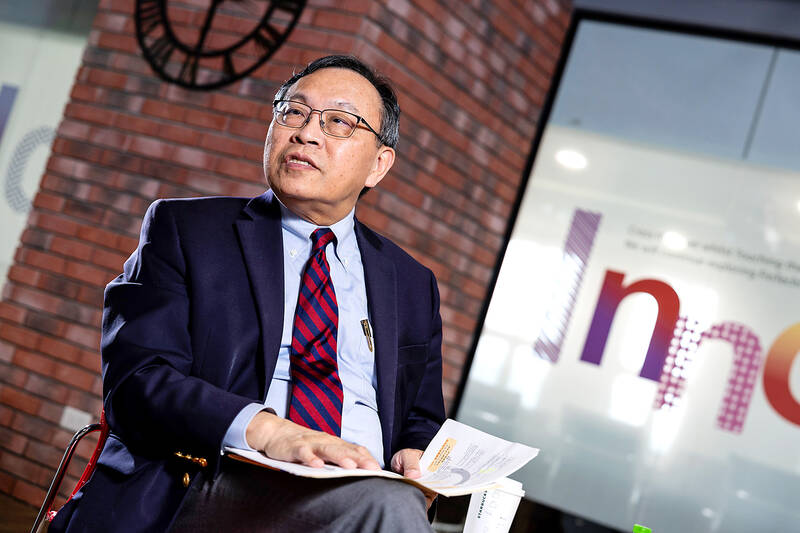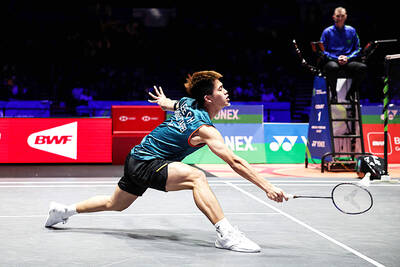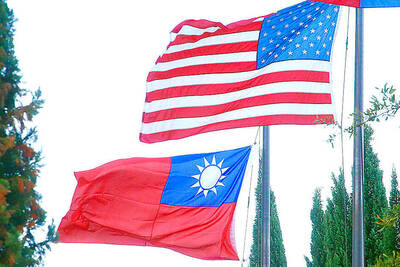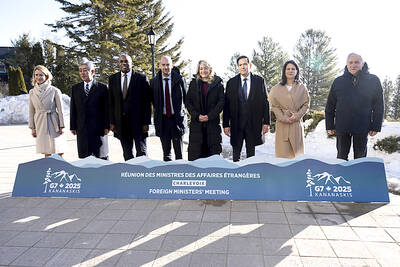The ratio of the Bank of Taiwan’s exposure to China over its net worth has fallen sharply to 3.42 percent as the bank seeks to reduce its reliance on the Chinese market, it said.
Bank of Taiwan chairman Joseph Lyu (呂桔誠), who has led Taiwan’s largest lender since 2016, said in a recent media interview that the ratio had plunged from a peak of about 45 percent eight years earlier.
That drop occurred as many Taiwanese investors diversified away from China to lower risks amid escalating trade tensions and technology competition between Washington and Beijing, Lyu said.

Photo: CNA.
Bank of Taiwan’s figure echoed data released by the Financial Supervisory Commission (FSC) earlier this month, which showed that Taiwanese banks’ exposure to China regarding their net worth as a whole for the first quarter of this year fell NT$8.14 billion (US$252.75 million), or 0.85 percent, from a quarter earlier to NT$952.86 billion.
However, the local banking sector as a whole still had a relatively high ratio of exposure to China, even though it fell 0.6 percentage points from a quarter earlier to 22.1 percent in the first quarter of this year, the FSC data showed.
The sector’s total exposure to China and the ratio have fallen to new lows since the commission started the tallies in the third quarter of 2013, the commission said, citing concerns over China’s economy and risks in the Chinese property market as a cause.
As for the fall in the Bank of Taiwan’s exposure to China, which has pushed down its profits generated from China, including Hong Kong, Lyu said the bank has been keen to seek a balance in corporate banking, consumer banking and services to the public sector to make up for a possible fall in profit.
Once profits from its corporate banking operations drops, the bank would be able to turn its attention to consumer banking services, he said.
Lyu said he is upbeat about Taiwan’s economic growth for this year, although uncertainty over when the US Federal Reserve would cut interest rates, sticky inflation and geopolitical unease are expected to affect the pace of the recovery.
Taiwan would fare better economically this year as artificial intelligence development has created tremendous business opportunities for the local sector, but old economy industries still face challenges, he said.
At the same time, the Bank of Taiwan is seeking to extend its global reach by setting up outlets overseas, he said, adding that it opened a representative office in Arizona in 2022.
That office would help contract chipmaker Taiwan Semiconductor Manufacturing Co (台積電), which is building advanced wafer fabs in the US state, as well as the chipmaker’s suppliers, Lyu said.

NATIONAL SECURITY: The Chinese influencer shared multiple videos on social media in which she claimed Taiwan is a part of China and supported its annexation Freedom of speech does not allow comments by Chinese residents in Taiwan that compromise national security or social stability, the nation’s top officials said yesterday, after the National Immigration Agency (NIA) revoked the residency permit of a Chinese influencer who published videos advocating China annexing Taiwan by force. Taiwan welcomes all foreigners to settle here and make families so long as they “love the land and people of Taiwan,” Premier Cho Jung-tai (卓榮泰) told lawmakers during a plenary session at the Legislative Yuan in Taipei. The public power of the government must be asserted when necessary and the Ministry of

Taiwan’s Lee Chia-hao (李佳豪) on Sunday won a silver medal at the All England Open Badminton Championships in Birmingham, England, a career best. Lee, 25, took silver in the final of the men’s singles against world No. 1 Shi Yuqi (石宇奇) of China, who won 21-17, 21-19 in a tough match that lasted 51 minutes. After the match, the Taiwanese player, who ranks No. 22 in the world, said it felt unreal to be challenging an opponent of Shi’s caliber. “I had to be in peak form, and constantly switch my rhythm and tactics in order to score points effectively,” he said. Lee got

EMBRACING TAIWAN: US lawmakers have introduced an act aiming to replace the use of ‘Chinese Taipei’ with ‘Taiwan’ across all Washington’s federal agencies A group of US House of Representatives lawmakers has introduced legislation to replace the term “Chinese Taipei” with “Taiwan” across all federal agencies. US Representative Byron Donalds announced the introduction of the “America supports Taiwan act,” which would mandate federal agencies adopt “Taiwan” in place of “Chinese Taipei,” a news release on his page on the US House of Representatives’ Web site said. US representatives Mike Collins, Barry Moore and Tom Tiffany are cosponsors of the legislation, US political newspaper The Hill reported yesterday. “The legislation is a push to normalize the position of Taiwan as an autonomous country, although the official US

CHANGE OF TONE: G7 foreign ministers dropped past reassurances that there is no change in the position of the G7 members on Taiwan, including ‘one China’ policies G7 foreign ministers on Friday took a tough stance on China, stepping up their language on Taiwan and omitting some conciliatory references from past statements, including to “one China” policies. A statement by ministers meeting in Canada mirrored last month’s Japan-US statement in condemning “coercion” toward Taiwan. Compared with a G7 foreign ministers’ statement in November last year, the statement added members’ concerns over China’s nuclear buildup, although it omitted references to their concerns about Beijing’s human rights abuses in Xinjiang, Tibet and Hong Kong. Also missing were references stressing the desire for “constructive and stable relations with China” and